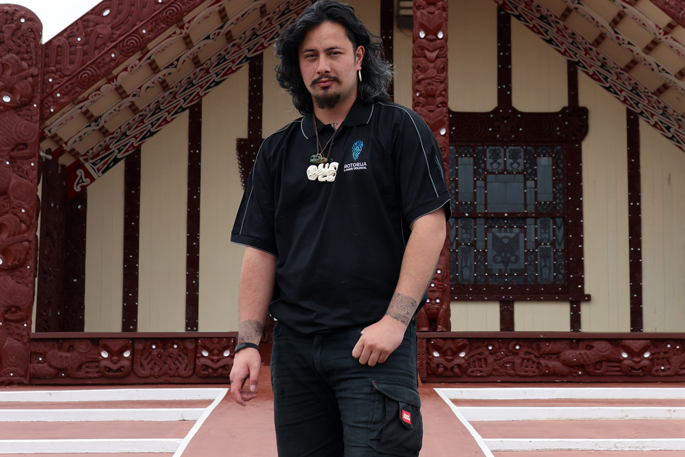New Animal Control Officer at Rotorua Lakes Council, Te Atu Rangi Reweti, uses his Māori culture to connect with people in his role.
The Ngati Rangiwewehi and Ngati Taraawhai descendent was raised by his late grandparents Mita and Hukarere Mohi.
His grandfather (Mita), created the Taiaha Wananga on Mokoia Island for rangatahi (young people).
“I was born in Rotorua, and shortly after, we moved to Australia. At the age of 2, my kuia (grandmother) visited, noticed I wasn't happy, so she packed my bags and brought me back to Rotorua.”
A fluent speaker of te reo Māori, Te Atu Rangi joined the Animal Control Unit in November last year and is enjoying the new job. The Unit operates seven days a week, year-round and most of the team’s time is spent on dog control issues such as barking, roaming and attacks on people, other dogs or stock.
The unit also manages dog registration. This often means they are faced with some dog owners who can be agitated.
“My koroua (grandfather) instilled in all of his children and moko the values of manaakitanga (respect) and whanaungatanga (kinship).
“He often said, ‘treat others as you want to be treated, with respect and empathy. Every day is a chance to learn, so always strive to do your best for others’.”
The 24-year-old says he has five essential tips for any whānau (family) considering getting a puppy or a dog this festive season.
“With dog ownership comes big responsibilities. All dogs, especially puppies, need nutritious food, a great place to sleep, a well fenced section and plenty of love and attention.
“Even in my short time at council I’ve seen some really sad cases of dogs being neglected or not being treated well. It’s really sad.”
It’s not just about dealing with complaints or issues for the animal control team. They also find homes for dogs that have been impounded and have not been claimed or have been abandoned.
While not all dogs can be re-homed due to the breed, temperament or health issues, the team tries to find new homes for as many as they can.
There is also a dedicated Facebook page -- Rotorua Pound – Homeless Hounds.
The year ending June 30, 2023, the team has managed to find homes for 80 dogs.
Choosing a name for your pet could be a great way to get tamariki (children) into taking more responsibility when it comes to owning a puppy for the first time. The top five dog names for 2023 are:
- Bella
- Max
- Poppy
- Buddy
- Ruby
Te Atu Rangi recently lost his dog and when he gets his next puppy he is looking to give it a Māori name.
“I'm thinking of naming my kurī after a famous Te Arawa dog, Pōtakatawhiti. It's a culturally important name.
“The first Pōtakatawhiti belonged to Tamatekapua, the second to Ihenga who helped find Lakes Rotoiti and Rotorua, and the third to Uenukukopako, the father of Whakaue. I believe giving your pet a meaningful name like this adds a lot of significance.”
Like all towns throughout the country, Rotorua has its fair share of roaming dogs. Ultimately, it is the dog owner’s responsibility to ensure their pets are secured on their property or while out walking.
“Council provides a number of areas where you can exercise your dog off the lead but you must still be able to control it as if it were on a leash.”
Elsewhere, you can walk your dog on a leash but dogs are not permitted in the Rotorua CBD.
After-hours calls about roaming dogs are assessed on a case-by-case basis and prioritised accordingly.
Te Atu Rangi says, all dogs over three months old must be registered and registration must be renewed each year by June 30.
In 2023 there were 11,936 registered dogs in Rotorua, down from 12,198 the previous year.
Council's Animal Control Unit works under the Dog Control Act 1996, the Rotorua Lakes Council Dog Control By-law 2005 and the Impounding Act 1955.
To report any animal-related issues call 07 348 4199.



0 comments
Leave a Comment
You must be logged in to make a comment.